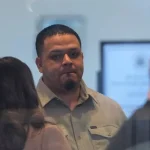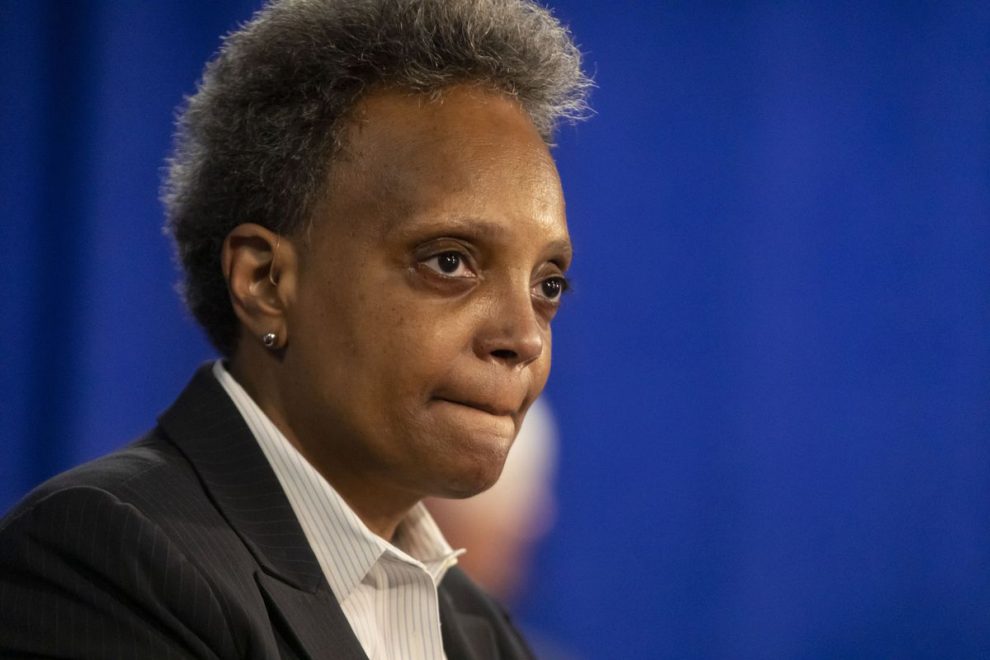Mental health professionals will be sent out to respond to some 911 calls in Chicago instead of cops, following defund the police protests and a number of police killings of mentally-unwell people.
The city is launching a two-part ‘alternative response’ pilot program this fall that takes a more public health approach to responding to 911 calls for mental health emergencies.
The initiatives aim to both ensure people suffering a mental health crisis get the help they need rather than face criminalization and free police up for tackling crime, amid a mass exodus of cops from the force.
A total of 363 officers retired from the Chicago Police Department between January and June this year, with another 56 on track to quit in July, according to figures from the police pension board.
If the trend continues, the mass departure will even dwarf the 560 retirements last year, when swathes of officers quit amid protests over the police murder of George Floyd and demands to defund the police.
With only around 13,000 cops remaining, Fox News reported that Chicago’s 117,000 gang members now outnumber officers by roughly 10 to one, at a time when the Windy City is facing a surge in violent crime.
More than 100 people were shot and at least 17 killed over July 4 weekend alone, while shootings have spiked 11 percent so far in 2021 compared to the same period last year.
Chicago’s new ‘alternative response’ programs will involve dispatching a team that includes a mental health professional and a paramedic to mental health-related calls, reported Chicago Sun-Times.
One program will involve sending a paramedic and a mental health clinician for ‘behavioral health calls.’
A second program will involve sending a paramedic with a ‘recovery specialist’ for calls relating to substance abuse, the outlet reported.
It is not fully clear how 911 dispatchers will determine which calls should be responded to by police officers or by mental health professionals.
However, the city said mental health professionals will be stationed inside 911 call centers to help monitor situations and, from October, will be responding to some 911 calls by phone.
DailyMail.com has reached out to the Chicago Mayor Lori Lightfoot’s office and the Chicago Police Department for more information.
The landmark program marks the first time 911 calls will not be responded to by police officers in the Windy City.
Ahead of the launch, the city is rolling out two dedicated ambulance teams in August who can respond to calls in 13 neighborhoods that deal with especially high rates of mental health emergencies.
The two teams each include a police officer trained in crisis intervention, a paramedic and a mental health clinician.
One team will be dedicated to calls in the North Side and the other in the South Side of the city, serving Uptown, North Center, Lakeview, Humboldt Park, West and East Garfield Park, West Englewood, West Elsdon, Chicago Lawn, West Lawn, Gage Park, Auburn Gresham and Chatham neighborhoods.
Alex Heaton, Lightfoot’s policy advisor for public safety, told the Sun-Times the city hopes the ‘public health approach’ to mental health calls will ensure residents get the help they need.
‘This is a brand new workforce for the city, and it’s an exciting opportunity to use a public health approach for people likely to come in contact with the first responder system,’ he said.
‘Are we reducing calls from an individual? Is it cost-effective? And are we able to connect folks with places that can address their medical concerns?
‘Are we able to engage these organizations to make 911 not be the go-to place?’
By having professionals trained in dealing with mental health crises respond to the calls, mental health patients can be given a pathway of support rather than end up in hospitals and jail, Heaton said.
‘The only options now are the ER or the lockup,’ Heaton said. ‘But in this pilot… they’ll bring you [to the center], help stabilize you and connect you with follow-up resources.’
The new initiatives are part of Lightfoot’s $3.5 million Crisis Assistance Response and Engagement plan unveiled last month.
The plan also includes three new 24/7 drop-off centers across the city for people struggling with mental health issues.
One of the sites is already up and running at the Roseland Community Triage Center, while the other two are set to open on the north and west sides of the city.
The city’s new approach to mental health calls comes in the wake of two high-profile police killings of teens who were suffering from mental health episodes.
Laquan McDonald, a 17-year-old black teen, was shot and killed by Chicago police Officer Jason Van Dyke in 2014 in the West Side of the city.
Police footage of the incident showed the cop shooting McDonald 16 times as he appeared to walk away from the officer while carrying a knife.
McDonald had learning disabilities and complex mental health diagnoses, having been hospitalized three times for psychiatric issues and arrested 26 times before his death.
Four years on form his killing, Van Dyke was found guilty of second-degree murder and 16 counts of aggravated battery over the shooting and was sentenced to seven years in prison.
One year after McDonald’s murder, 19-year-old student Quintonio LeGrier was shot and killed by cops the day after Christmas Day 2015.
LeGrier was carrying a bat when officers responded to a call at his father’s home.
Chicago Police Department officer Robert Rialmo opened fire shooting LeGrier six times, killing him, and also killing the teen’s neighbor who was caught by a stray bullet.
LeGrier was an engineering student at Northern Illinois University and had started showing signs of poor mental health and had been admitted involuntarily to a hospital for a psychiatric evaluation.
The morning he was killed he had called 911 three times in mental distress claiming someone was threatening his life.
One 911 dispatcher hung up the call on the teen.
LeGrier’s father then called 911 to report his son trying to break down his door with a baseball bat.
The two cases sparked uproar in Chicago and fueled demands for an overhaul to how mental health calls are dealt with by law enforcement.
The city launched crisis intervention training but calls for police reform grew further last year, following Floyd’s murder at the hands of white cop Derek Chauvin.
In 2019, Chicago cops responded to 41,000 mental health calls, according to Supt. David Brown.
As well as meaning people are not getting the help they need, this also diverts police away from tackling crime in the city at a time when shootings are surging and cops are quitting.
Chicago Police pension board figures reveal more cops have left the force so far in 2021 than did in the whole of 2018.
In total, 363 officers retired between January and June compared to 339 in 2018.
The numbers have steadily risen to 475 in 2019 and 560 in 2020 but Ald. Ray Lopez warned the Sun-Times the department is on track ‘to have one of the highest retirement numbers in the city’s history.’
The latest crime data from Chicago PD shows there have been 1,688 shooting incidents from January through July 11 this year.
This marks an 11 percent increase on the 1,515 recorded in the same period last year.
Criminal sexual assault has also surged 23 percent in the same timeframe while murders dipped 1 percent and overall crime 6 percent.
July 4 marked a particularly bloody weekend for the city with at least 108 people shot, 17 fatally, between July 2 and July 4.
Eleven children, some as young as five and six, were wounded in what was the most violent weekend of the year.
Two ATF agents and a police officer were among the city’s shooting victims.
Story cited here.
























